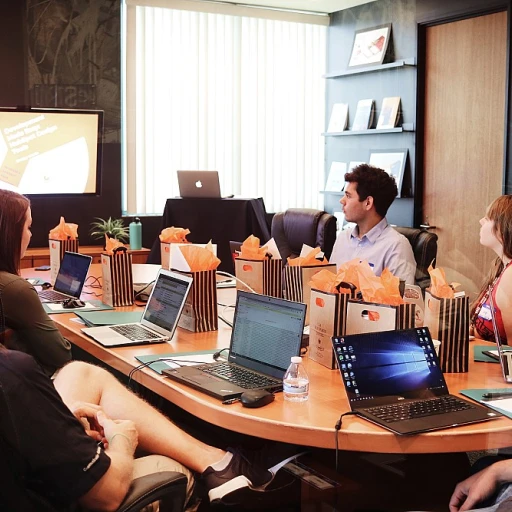
Understanding Gen Z in the Workplace
The Gen Z Mindset: Navigating the Modern Workplace
Understanding the dynamics of Gen Z in the workplace begins with recognizing their distinct characteristics. Born in the tech-savvy era, these young professionals are quick to embrace digital transformation, making them invaluable assets in today's businesses. As they transition from future-focused high school students to burgeoning young leaders, their expectations diverge notably from those of previous generations like baby boomers and gen millennials. This generation prioritizes not just the paycheck but also meaningful work and career fulfillment. They seek out jobs that align with their personal values, with a strong emphasis on work-life balance and mental health. While the need for financial stability remains, Gen Z employees value opportunities for professional development and career readiness more than any generation before. They desire roles that challenge them, allowing continuous learning and skill development. With the rise of social media, career aspirations are more influenced by networks and experiences shared online. In https://www.employee-retention.net/blog/enhancing-employee-retention-through-effective-distance-learning-feedback, it's highlighted how crucial continuous feedback and adaptive learning are for retaining this generation. A keen awareness of these factors is essential in constructing career paths that not only attract but retain Gen Z employees. It's not just about offering jobs—it's about presenting a compelling vision for their professional journey within the industry. An understanding of these nuances ensures a sustainable career trajectory for these young employees, allowing them to contribute effectively to the long-term success of any business.The Importance of Tailored Programs
Why Programs Need to be Tailored for the Rising Generation
In the realm of workplace management, tailored programs are emerging as a key strategy to engage and retain members of the younger workforce, particularly Generation Z. This cohort, which is steadily entering the job market, brings distinct characteristics and expectations that traditional business practices may not fully address. Recognizing and adapting to these differences is crucial for today's organizations.
Firstly, there's an increased focus on career development and career readiness. Unlike previous generations, many Gen Zers prioritize opportunities for personal and professional growth over immediate financial compensation. For them, learning and advancement prospects are critical. Organizations can harness this motivation by offering tailored learning and development programs designed to enhance skills and prepare them for long-term success.
An integral facet of connecting with Gen Z is recognizing their digital-savvy nature. Having grown up with social media and technology, these young professionals expect cutting-edge solutions and tools in the workplace. This includes offering programs that utilize digital platforms for training and engagement, ensuring that young employees feel connected and invested in the company's future.
Mental health and work-life balance are other areas where Gen Z's expectations differ from earlier generations like the baby boomers. Companies aiming to retain young talent should tailor initiatives that promote a healthy work environment, support mental health, and encourage a life balance that accommodates changing employee needs.
Lastly, while salary and financial incentives remain important, many Gen Z workers are equally drawn to organizations that demonstrate social responsibility. This generation, in particular, values working for businesses that contribute positively to society. Tailored programs that imbue a sense of purpose and align with social causes can thus play a pivotal role in attracting Gen z employees.
In summary, tailoring programs to address these unique wants and needs is not only a part of engaging and retaining Gen Z but is becoming increasingly vital in inspiring and empowering the next wave of industry leaders. As organizations design their initiatives, these considerations will differentiate successful programs from those that fall short.
Key Elements of a Successful Rise Program
Crafting Effective Development Pathways
Understanding what makes tailored programs successful for engaging Gen Z is crucial in today's ever-evolving workplace. These programs must align with the unique preferences and needs of this generation—young professionals entering the workforce from college, career-ready and eager to make their mark. Incorporating elements like personalized career development and growth opportunities is vital. Gen Z values continuous learning and wants to see a clear roadmap for advancement within a business. Programs should focus on bridging the gap between student skills and industry expectations, enhancing career readiness while offering real-world experience. By fostering effective work-life balance, employers can further appeal to these young leaders. Social media plays a significant role in how Gen Zers perceive potential employers. Leveraging platforms to promote business culture and professional development initiatives can create a sense of belonging early in their career. Moreover, prioritizing mental health and ensuring a supportive environment can increase employee satisfaction and retention. This involves not only balancing work life but also incorporating support systems such as mentoring or coaching technology. It's crucial for programs to address challenges and adjust in real-time for this aspirational generation who are markedly different from baby boomers and Gen millennials. Ultimately, the rise of tailored programs signifies a shift towards a more engaging workplace for Gen Z, where young people are empowered to harness their skills and contribute significantly to the organization's success. For more insights on how recognizing individual contributions can enhance retention, explore the strategies discussed in this key to retention article.Challenges in Implementing Gen Z Programs
Overcoming Hurdles in Implementing Gen Z Programs
Implementing programs tailored for Gen Z, designed to foster employee retention and professional development, comes with its set of challenges. Understanding the dynamics of this young generation is crucial for businesses aiming to integrate Gen Zers successfully into their workforce. Firstly, balancing traditional work expectations with the fresh perspectives of Gen Z can pose a significant challenge. These young professionals often prioritize work-life balance and mental health, viewing these factors as essential components of their career and personal development. Employers need to adapt their approaches, potentially re-evaluating their work-life structures to accommodate these values prominently. Moreover, resistance to change from more established generations, like baby boomers and even some Gen millennials, can hinder the successful rise of Gen-related programs. Bridging the generational gap requires open communication and inclusivity, creating an environment where contributions from all employees, regardless of age, are valued and heard. In addition, integrating modern technologies and platforms that resonate with Gen Z, such as social media and online learning tools, can be resource-intensive yet crucial. Gen Z is tech-savvy, having grown up in a digitized world, and prefer engaging, varied learning modes that align with their professional journey and skill set enhancement. Companies may also encounter challenges in keeping Gen Z engaged over the long term. This generation, while career-oriented and eager for opportunities, tends to seek roles that offer rapid growth and continual learning. Employers need to provide structured pathways for upward career readiness and development, often through tailored training development programs, to harness the potential of these ambitious early career professionals. Finally, overcoming misconceptions about Gen Z's work ethic, often viewed through stereotypes, is key. Companies must make a conscious effort to see Gen Zers as they are—a diverse group of individuals ready to bring innovation and dedication to the workforce. By proactively addressing these hurdles, organizations can create a nurturing, inclusive ecosystem that not only attracts Gen Z but retains them effectively, ensuring a dynamic and evolving workplace.Case Studies: Successful Gen Z Programs
Real-World Success: Case Studies on Gen Z Programs
Understanding the intricate needs and aspirations of Gen Z in the workplace has paved the way for businesses to devise innovative strategies aimed at engaging this generation effectively. Several organizations have implemented tailored programs that demonstrate the potential and adaptability required to engage these young professionals, ensuring long-term employee retention. One such thriving example comes from an industry giant in the technology sector. The company recognized the distinct career readiness and social media fluency of Gen Z employees. In response, they introduced a "Digital Career Pathway" initiative. This program offered young leaders a range of opportunities focused on skill development, career advancements, and professional networking. Young people were able to choose their own development tracks, aligning their interests and career goals with the business objectives. This initiative not only attracted recent college graduates and high school finishers but also ensured their growth within the company. In the realm of social work, a prominent non-profit organization devised a mentorship-driven program to integrate Gen Z into the sector. They focused on providing real-world projects that allowed young employees to learn effectively while contributing significantly to meaningful causes. This training development approach facilitated work-life balance, helping alleviate potential mental health issues faced by these young professionals. Meanwhile, a global retail brand successfully introduced modular learning sessions via virtual platforms, catering specifically to the fast-paced learning style associated with Gen Z. These sessions, inspired by gaming and social media elements known to resonate with this generation, emphasized learning and engagement. The adaptation addressed the varying learning paces of employees, aided by feedback loops that encouraged continuous improvement and motivation. By exploring these case studies, it becomes evident that tapping into Gen Z's values—such as career growth, skill acquisition, and a balanced life—is crucial for fostering retention. Businesses harnessing such tailored programs stand to benefit not only from increased employee morale but also from a vibrant, innovative workforce aligned with future trends in the industry.Future Trends in Employee Retention
Emerging Trends in Employee Retention
As businesses continue to evolve, understanding the future trends in employee retention becomes crucial, especially when engaging with Gen Z. This generation, characterized by their digital fluency and desire for meaningful work, is reshaping the workplace landscape. Here are some key trends to watch:
- Focus on Mental Health: With increasing awareness around mental health, companies are prioritizing mental well-being programs. Gen Z values a work environment that supports their mental health, which in turn boosts retention.
- Flexible Work Arrangements: The demand for work-life balance is stronger than ever. Offering flexible schedules and remote work options can significantly enhance job satisfaction among young professionals.
- Integration of Social Media: Social media is not just a tool for marketing but also a platform for engagement and learning. Companies are leveraging social media to connect with employees and foster a sense of community.
- Emphasis on Career Development: Gen Z seeks opportunities for professional growth. Providing career readiness programs and continuous learning opportunities can help retain these young leaders.
- Technological Advancements: The rise of coaching technology and other digital tools is transforming training development. These innovations offer personalized learning experiences, catering to the unique needs of Gen Z employees.
As the workforce continues to diversify, businesses must adapt to the changing expectations of young employees. By focusing on these trends, companies can create a supportive environment that not only attracts but also retains top talent from this dynamic generation.













